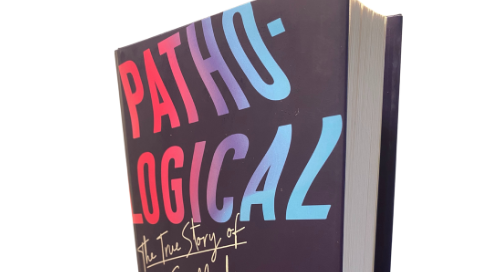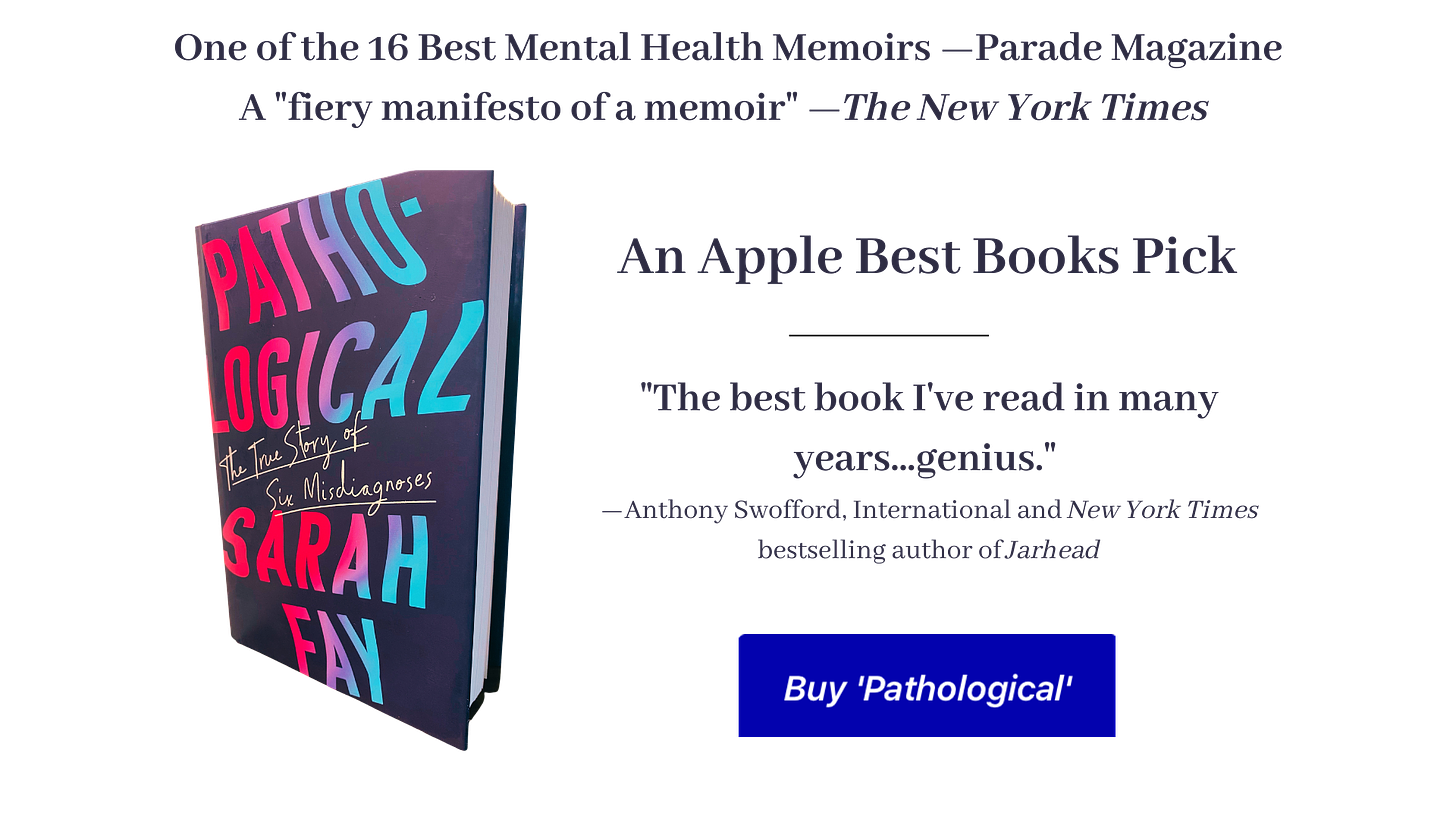🎧 Listen to the podcast version:
If you’re a writer, you likely have a success fantasy—the writerly dream that signals “making it.” (Go ahead. Think of yours.) It typically involves words like bestseller, Pulitzer, national book tour, Today Show appearance, Oprah book club pick, and, of course, powerhouse agent and six- (or seven-) figure book deal.
(Pick yours if you haven’t already.)
In my twenties and thirties, mine was getting a powerhouse agent and a six-figure book deal. I lived in New York—Williamsburg, pre-pre-pre-gentrification—in a basement apartment that leaked every time it rained. My job was as a writer-in-residence in the New York City public schools teaching students with severe physical and mental disabilities, often in economically deprived areas in the nether regions of the five boroughs. Riding the subway—sometimes three or four hours a day—being jostled by those around me, my regular practice was to imagine the moment when a powerhouse agent would call to say that she was two-thirds of the way through my manuscript and loved it and told me not to talk to any other agent until she could finish reading it and discuss representation with me. In true wanna-be-a-writer fashion, I hadn’t even written a book yet.
Twenty-five years later, on a dismal March afternoon at the start of the pandemic, I stood in my kitchen, staring at my phone, reading an email from just such a powerhouse literary agent about my memoir, Pathological: The True Story of Six Misdiagnoses. The email was almost word-for-word what I’d wanted. Another e-mail arrived saying that the agent was cc’ing her assistant to schedule a phone meeting.
The rest happened fast. The manuscript, she said, needed no revisions. (This is somewhat unheard of.) It was ready to be shopped to publishers. I signed with her, and we sold it in a month.
The afternoon my book went to auction, I sat on a bench in Lincoln Park. The pink buds of a flowering tree I didn’t know the name of were beginning to open. Across from me was a bronze statue of William Shakespeare. Someone had fastened a pink surgical mask over his mouth.
My cell phone rang, and my dream agent told me I’d gotten a dreamy six-figure book deal with a dreamy big-five publisher.
Before you feel anything close to envy, let’s go over a few things:
I’d been a professional writer—publishing in The New York Times, The Paris Review, The Atlantic, etc.—for twenty years, struggling financially, mentally, and emotionally. (No Substack back then!)
I had three failed manuscripts (“failed” in the sense that I knew they weren’t my best work) in their deserved spot in an archived file on my computer that I’ve since trashed.
And despite what my (and perhaps your) fantasy-riddled brain may think, no lottery-winner-esque check arrives. Authors are paid the advance over three to four years, minus your agent’s commission and other publicity and miscellaneous expenses, which can be substantial these days. What’s left goes very fast when you’re trying to do things like, well, pay rent and eat.
Sitting in the park that day, I should have declared to myself that Pathological was a success. I’d gotten the powerhouse agent and the book deal. I should have waved to Shakespeare, smelled the soon-to-be flowers, and walked away filled with gratitude.
I’m ashamed to write this, but that night, sitting in the bath, my cat poking his head over the edge of the tub with a wide-eyed expression on his face that said he still didn’t understand what all that water was doing there, I cried. There’s nothing wrong with crying; what’s shameful is that my tears came not from joy but disappointment. I thought one of the other publishing houses at auction was more prestigious than the one that bought my book.
I’m not an ungrateful person, not petty or selfish except in the ways that all humans are. How could I have felt disappointed at so much good fortune? I was extremely lucky, especially at that moment in history when people were dying and their lives were falling apart.
Things kept getting better, and I kept becoming more desperate for whatever I didn’t have.
The publication date was very far off; then it was imminent. The pre-pub-date publicity run included a starred Kirkus review and an Apple Best Books pick. On the day of publication, Pathological debuted at number one in some obscure Amazon category. (Beware those touting themselves as “Amazon bestselling authors.”) One particular NPR interview resulted in a huge jump in sales, positioning my book in the vicinity of actual bestsellers. I got a TV spot. I was a guest on lots and lots and lots of NPR and other radio shows and podcasts. Pathological was featured in Oprah Daily and Forbes and many, many media outlets. And—the most coveted of all—The New York Times review was glowing.
And none of it was enough. Every morning, I’d walk around the lagoon and do my daily gratitude meditation, and it all felt forced. I wanted that NPR show and that TV spot and that bestseller list and those interview requests. That award and that mention and that review and that book club pick.
How could I have been so awful?
It’s taken me a long time to see that I wasn’t awful; I was actually being very human. Evolutionarily speaking, we’re designed to seek and seek and seek until we find the food and shelter we need to propagate the species. The problem? Food is readily available to many in developed countries (although much of it is toxically unhealthy). If you’re like me and have a home, that’s taken care of, too. Still, we seek and seek because we’re programmed to do so, even though many of us live in societies where there’s too much of everything, and it’s never enough because we already have what we need.
Substack is designed for seeking, too: subscribers, shares, restacks, paid subscribers, likes, being featured…. We want all of it, any of it, more of it—without even pinpointing what “it” is. (In his recent post Prison Break,
talks about this in terms of social media.)Even if Substack and book publication and social media didn’t exist, we’d still do it.
But there’s an antidote: Incessant seeking occurs when we don’t set a goal. One goal. People think goals are about achievement. No, they’re about focus and being satisfied.
I needed to say, Okay, the powerhouse agent is it; everything else is gravy. Or NPR is the end-all, be-all. (Note: To my family, NPR is. Even if I win the Nobel Prize for Literature, they’ll say, Yeah, but remember when you were on NPR?)
The antidote for you:
Set one very clear (not impossible) goal for the year. Just one. One.
Break it down into quarters, months, and weeks—and that’s all you get to think about and use as a measuring stick.
Sure, have fleeting ambitions for other things, but if it’s not the one goal, don’t pay attention to them.
If you do this right, the one goal won’t be something to strive for because it’s there to keep you centered—to help you do your best work without being distracted by your seeking brain.
Instead of randomly chasing after moving targets—which, once you hit them, won’t seem good enough anyway—a single goal will let you feel at rest inside yourself and connected with your writing and the world, which I’m pretty sure is what true gratitude really is.
Join the Writers at Work community so you’re never alone and get all the writing guidance you need. Subscribe to get workshops, interviews, courses, and posts on mastering the art and business of being a writer on Substack.
Replace confusion and frustration with personalized Substack guidance—explore the Single Substack Strategy Intensive or Strategic Substack Growth Package.






Thank you, Sarah. I needed to read this today. This line stopped me cold: "Authors are paid the advance over three to four years, minus your agent’s commission and other publicity and miscellaneous expenses, which can be substantial these days." Whoa. I did not know that.
But this helps me understand a conversation I had with Bryan Mealer, co-author of The Boy Who Harnessed the Wind, some years ago. Bryan had all kinds of success with that book, but he was having serious doubts about taking on another project. (I elaborate in a Note here https://substack.com/profile/2000333-joshua-dolezal/note/c-39922144).
What you capture here is also core dissonance for many academics. Nothing is ever enough. Any leisure time is wasted time. This works directly in opposition to other human needs and responsibility, like love and parenting. It's so ironic that teachers and writers can feel like they are pursuing a calling and instead fall prey to the same trap that Tolstoy's Ivan Ilyich does in his obsessive pursuit of status and wealth -- only to learn on his deathbed that he'd lived the wrong life.
For my own part, the takeaway is less about setting goals than it is about paying attention to the "why" of writing, which so often has nothing to do with the big breakthroughs and much more to do with conversations like these. Thanks again for writing with such honesty.
Hedonic adaptation can be an ugly thing, especially for success adicts, but you're right: it is a very human thing. I'm glad you're no longer beating yourself up about it. Brilliant post, as ever.